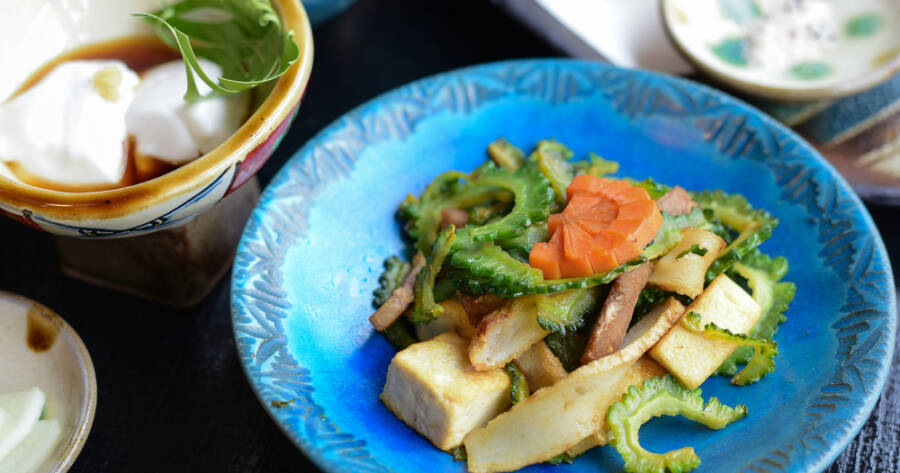Okinawa, a small island in Japan, is known for its high life expectancy and low rates of chronic diseases. The residents of Okinawa, particularly those over 100, are often studied for their lifestyle habits, especially their diet. Okinawa’s approach to food offers valuable lessons for those who wish to age gracefully, maintaining good health and vitality throughout their lives. Explore the secrets behind Okinawa’s daily diet and what it can teach us about aging well.
1. Plant-Based Focus
One of the central features of Okinawan cuisine is its heavy emphasis on plant-based foods. The island’s residents consume a variety of vegetables, legumes, and grains, with a strong reliance on nutrient-dense foods like sweet potatoes, tofu, and seaweed. This plant-based approach provides a wealth of vitamins, minerals, and antioxidants that support overall health.
A diet rich in fruits and vegetables helps reduce the risk of chronic diseases such as heart disease, diabetes, and certain cancers. The antioxidants found in these foods protect the body from oxidative stress, which accelerates aging. By consuming a variety of plant-based foods, Okinawans are able to maintain a healthy balance of nutrients that promote longevity and support the body’s natural defenses.
2. Moderate Calorie Intake: The 80% Rule
Okinawans follow the principle of “Hara Hachi Bu,” which translates to “eat until you are 80% full.” This approach to eating encourages people to stop eating before they feel completely full, promoting moderation and preventing overeating. This practice is believed to contribute to the Okinawan population’s impressive longevity and low rates of obesity.
By eating smaller portions and not overloading the body with excess calories, Okinawans avoid the strain on the digestive system that can come with overeating. Chronic overeating is linked to various health issues, including weight gain, heart disease, and a higher risk of aging-related illnesses. This principle of mindful eating not only helps prevent weight gain but also promotes a more balanced metabolism.
3. Healthy Fats and Lean Proteins
Okinawans consume small amounts of healthy fats and lean proteins, which are essential for maintaining muscle mass and supporting brain health as they age. Fish, particularly fatty fish like mackerel and tuna, is a common protein source, providing beneficial omega-3 fatty acids that promote heart health and reduce inflammation. Additionally, tofu and legumes offer plant-based proteins that are easy on the digestive system and provide sustained energy.
The inclusion of healthy fats and lean proteins in the Okinawan diet plays a crucial role in keeping the body and brain functioning optimally. Omega-3 fatty acids are particularly important for brain health, as they help maintain cognitive function and reduce the risk of age-related mental decline, such as dementia or Alzheimer’s disease. Lean proteins also support muscle maintenance, which is vital for maintaining mobility and independence in older age.
4. Balanced Eating with Minimal Processed Foods
The Okinawan diet is characterized by a strong focus on whole, unprocessed foods. Fresh vegetables, grains, and seafood are staples in their meals, and processed foods are kept to a minimum. This is a key factor in aging gracefully, as a diet high in processed foods can lead to inflammation, weight gain, and an increased risk of chronic diseases.
Many processed foods are high in refined sugars, unhealthy fats, and artificial additives that contribute to aging-related health problems such as diabetes, cardiovascular disease, and obesity. By sticking to a diet that prioritizes fresh, unprocessed ingredients, Okinawans minimize the intake of harmful substances that can accelerate aging and affect overall health.
5. Social and Cultural Connections
In addition to the foods they eat, Okinawans benefit from strong social and cultural connections that enhance their overall well-being. Meals are often shared with family and friends, creating opportunities for meaningful social interaction and emotional support. Research has shown that strong social bonds are linked to better health outcomes and a longer life expectancy.
Eating together as a community also promotes a sense of purpose and belonging, which is essential for mental and emotional health. Loneliness and isolation can lead to negative health effects, including depression, anxiety, and increased stress levels. By cultivating strong social networks and staying connected with loved ones, Okinawans contribute to their mental and emotional resilience, which in turn supports their physical health.
Lessons for Aging Gracefully
Okinawa’s daily diet offers valuable lessons for those looking to age gracefully. By focusing on plant-based foods, practicing mindful eating, and choosing healthy fats and lean proteins, Okinawans support their bodies in maintaining health and vitality as they age. The emphasis on social connections and cultural bonds also plays a crucial role in their overall well-being.
Adopting some of these practices in our own lives can help us stay healthier for longer, reducing the risk of chronic diseases and promoting a more fulfilling, active lifestyle. Aging gracefully is not just about physical health; it’s about nurturing the mind, body, and spirit together. By following Okinawa’s example, we can build a foundation for a long, healthy, and meaningful life.

